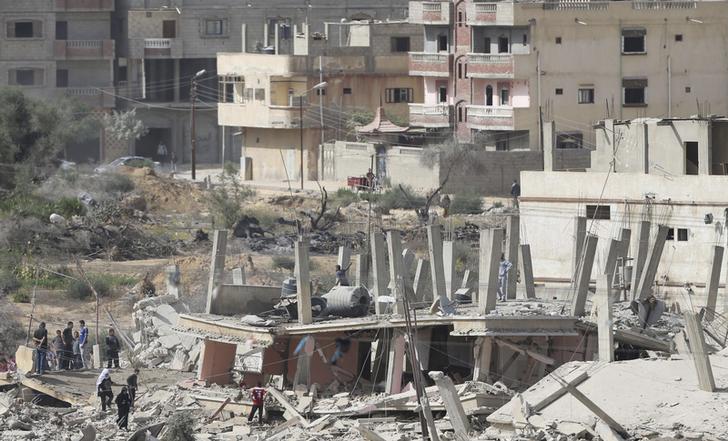Latest NEWS
- Aswat Masriya, the last word
- Roundup of Egypt's press headlines on March 15, 2017
- Roundup of Egypt's press headlines on March 14, 2017
- Former Egyptian President Hosni Mubarak to be released: lawyer
- Roundup of Egypt's press headlines on March 13, 2017
- Egypt's capital set to grow by half a million in 2017
- Egypt's wheat reserves to double with start of harvest -supply min
- Roundup of Egypt's press headlines on March 12, 2017
Egypt's eviction of border area residents in Sinai 'violated international law' - HRW

People gather around the remains of a house after it was blown up during a military operation by Egyptian security forces in the Egyptian city of Rafah, near the border with the southern Gaza Strip October 30, 2014. Egypt began clearing residents from its border with the Gaza Strip on Wednesday to create a buffer zone following some of the worst anti-state violence since President Mohamed Mursi was overthrown last year. REUTERS/Ibraheem Abu Mustafa
CAIRO, Sept 22 (Aswat Masriya) - The Egyptian government's destruction of thousands of buildings in the Rafah border area to "counter the threat of smuggling tunnels was likely disproportionate," Human Rights Watch (HRW) said in an 84-page report released Tuesday.
Egypt's cabinet issued a decision to clear 500 metres of the border area with Gaza of civilians in October 2014, vowing to provide compensation for those evicted. The following month the stretch of area to be cleared doubled to one kilometre.
HRW said that according to analysis of satellite images, "large scale demolitions" in the border area actually began almost a year earlier, in July 2013, following the army's removal of then President Mohamed Mursi after protests against his rule.
Some 540 buildings within the border area were destroyed between Mursi's ouster and the cabinet's decision last year.
Following the cabinet's decree, 2,715 homes were destroyed, HRW said, which brings the total to at least 3,255.
Titled "Looking for Another Homeland," the report was based on interviews with members of 11 evicted families, as well as activists and journalists.
The destructions "did not meet the requirement under the laws of war that Egypt’s army target only specific military objectives," HRW said, adding that international law "prohibits" forced evictions.
HRW said that it had contacted the foriegn ministry, the presidency, cabinet and other concerned government bodies to communicate the findings of the report, but were offered no response at time of publication.
One day ahead of the report's release, the Egyptian cabinet of ministers emailed a statement to the press on the measures taken to fight "terrorism" in Sinai, saying that a "comprehensive plan" was adopted in the peninsula.
The plan complies with "recognised international human rights laws and standards to guarantee the protection of the lives and property of citizens," the Egyptian cabinet said in the statement, adding that it was "determined" to continue with its plan.
According to the HRW report, residents were not provided with written notice of their eviction, many hearing about them from their neighours, army patrols or the media.
Residents were "often told to pack up their lives and leave within 48 hours," the report said, contradicting the Egyptian Cabinet's claims that "all measures were taken in consultation and coordination with local residents."
As for the compensation, HRW said that the Egyptian government had indeed provided it, but most families the organization spoke to found it "inadequate to purchase new homes or land equivalent to their former property."
Additionally, no compensation was offered for the destroyed agricultural land which was their source of living.
Yet, the Egyptian government cites a "precise scheme" used to compensate residents affected by the security campaigns.
HRW called on the Egyptian government to hault demolitions until it considers other "less destructive means" and provide "immediate and unhindered" access and cooperation to international observers, journalists and human rights monitors.
It also called on the government to provide compensation for agricultural lands and ensure that previously provided accommodation is adequate.
The northern part of the Sinai Peninsula is the site of fierce battles between Egyptian security forces and militants, who mostly target police and army posts.










